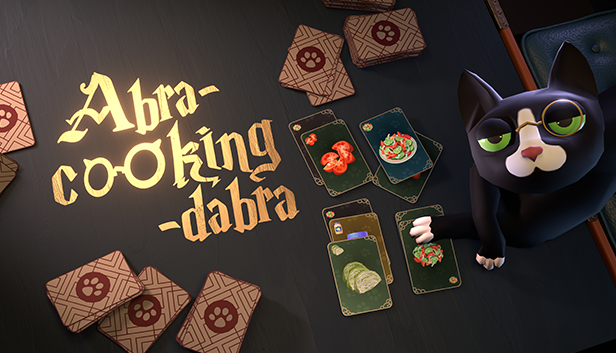
Abra‑Cooking‑Dabra is a delightfully off‑kilter cooking card game that flings a London‑bound chef into Wonderland’s only mobile café, where eccentric patrons; and a smug, unsettling Cat; turn every service into a charmingly chaotic puzzle. You don’t chop or flip in real time so much as assemble British dishes from a shifting deck of ingredient and tool cards, decode cryptic order hints, and squeeze recipes into a cramped counter while timers tick down. The result is a clever mashup of deckbuilding and time‑management that rewards planning and improvisation: it’s less about frantic reflexes and more about juggling scarce resources, reading customers, and finding elegant card combos under pressure.
Gameplay and systems
The game’s loop centers on clever deck management and slow‑burn recipe discovery: each visitor’s order drops a cryptic hint about the ingredients and tools you’ll need, but assembling the rest is a process of experimentation and deduction. Satisfy customers to unlock new cards, scavenge or buy ingredient packs in the shop, and even cultivate fresh produce on a tiny farm to refill your pantry, every choice reshapes the cards available for the next service. Deck upgrades and tool improvements let you lean into particular strategies, while special guests throw curveball requests that reward creative combos and lateral thinking. Limited counter space and scarce resources make every placement meaningful, and the universal pause button converts frantic moments into deliberate puzzles, so the game plays like a tense, methodical card puzzle rather than a reflex test.
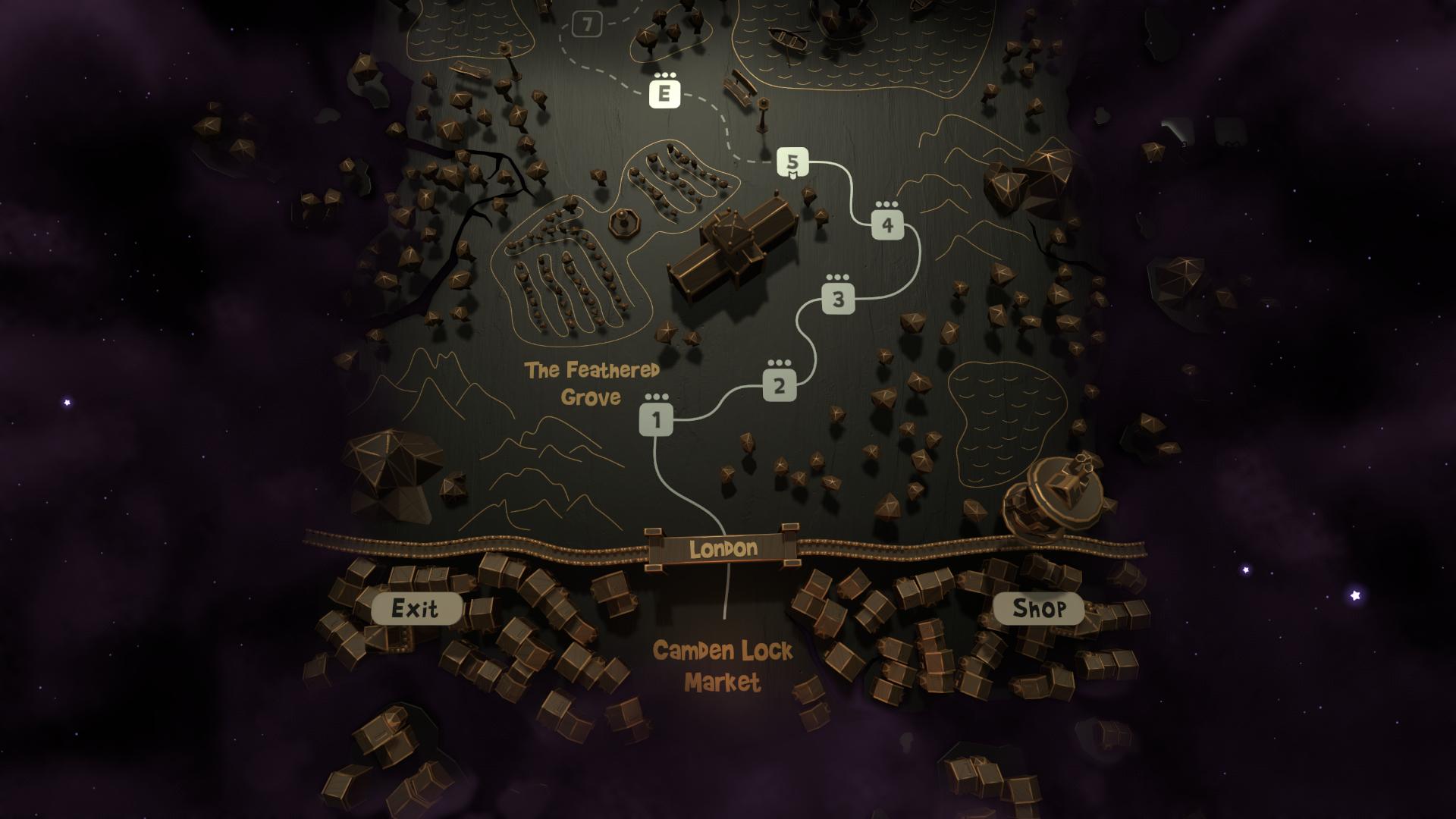
Presentation and tone
Door 407 leans fully into a playful, slightly off‑kilter Wonderland vibe, and the game’s presentation sells it at every turn: charming, expressive character art and fluid animations give each patron personality, while a warm, whimsical soundtrack and carefully mixed sound design add texture without ever becoming intrusive. Small visual flourishes; subtle particle effects, animated UI microinteractions, and tasteful color palettes; make the kitchen feel alive, and clear tooltips and contextual highlights do a good job of communicating recipes and interactions so you rarely have to guess what to do next. The result is a lively, characterful café that feels busy and theatrical without tipping into visual chaos, keeping focus on the fun of juggling orders and discovering combos.
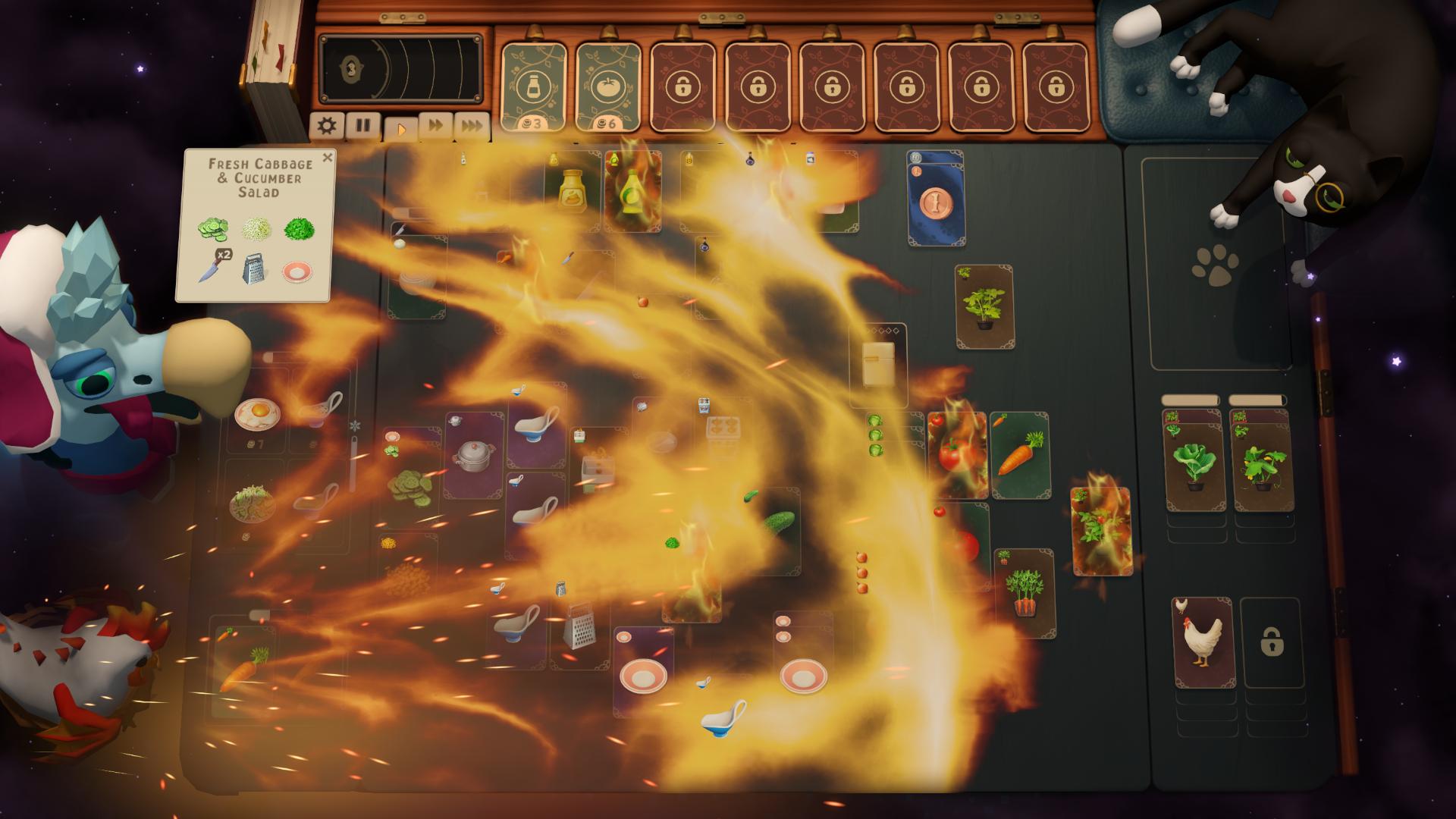
Friction points and technical issues
Abra‑Cooking‑Dabra’s core design is clever and engaging, but a handful of practical issues frequently undercut the fun. Limited counter real estate and an ever‑expanding recipe list make late‑game levels feel cluttered and repetitive, pushing players into a stop‑start loop of pausing, selling cards, and micromanaging space instead of discovering emergent strategies. The game’s reliance on randomized card packs for critical ingredients exacerbates that friction; chasing a single rare drop often devolves into tedious reselling rather than creative problem‑solving. Technical hiccups reported by players; missing purchases, stuck or non‑completing orders, disappearing pots, and persistent audio bugs; break flow and sometimes force full level restarts, turning what should be satisfying runs into aggravating resets. Pacing also needs attention: long waves with many customers amplify small mistakes and make recovery feel punishing rather than challenging. These are fixable problems; better workspace design, clearer inventory tools, more reliable drop systems, tighter level pacing, and prompt bug fixes would preserve the game’s charm while smoothing the rough edges that currently limit its replayability.
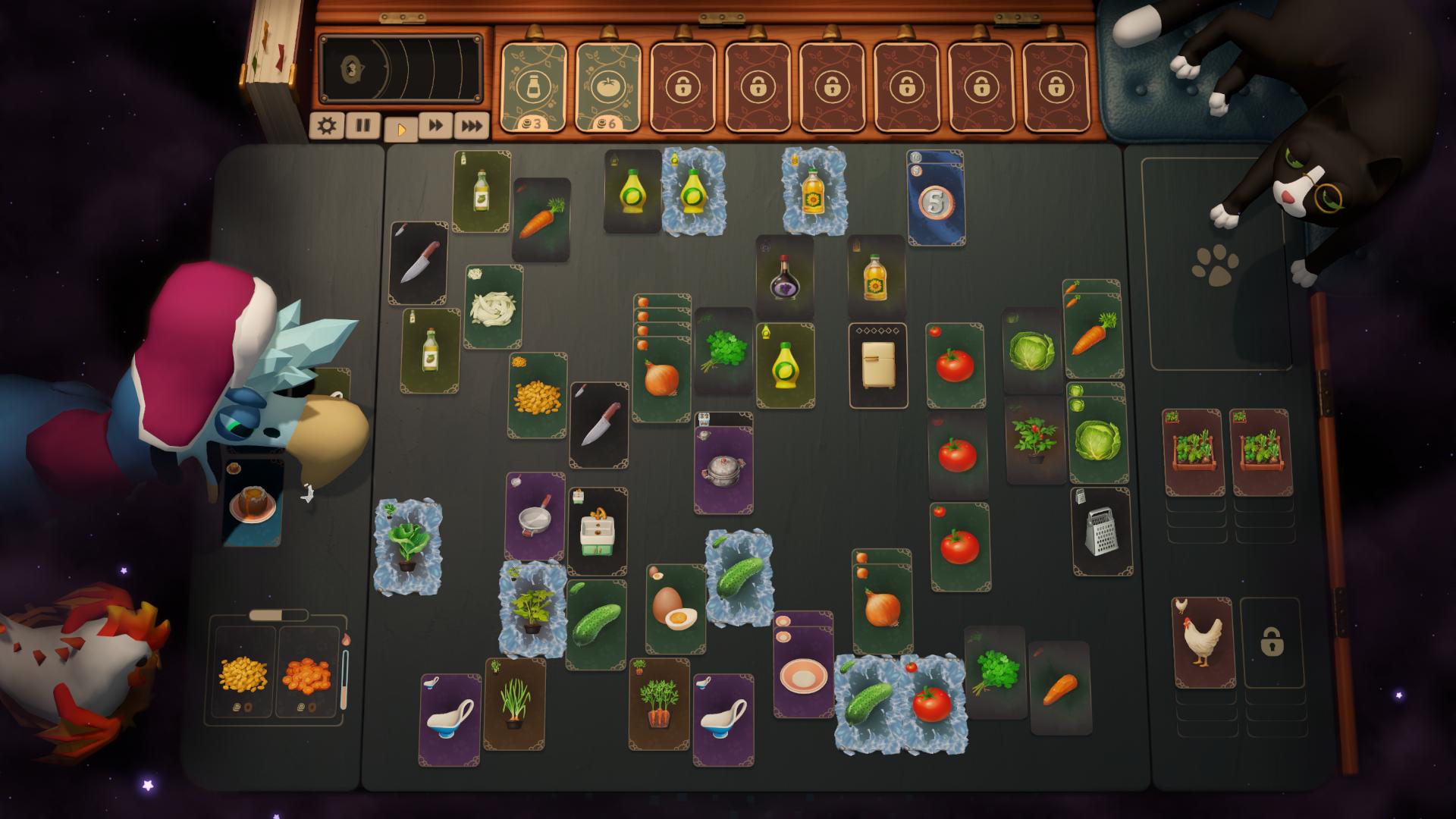
Design balance and learning curve
The game occupies an uneasy middle ground between cozy and stressful: ticking timers and increasingly cluttered boards inject genuine pressure, yet the universal pause button often diffuses that urgency into methodical planning rather than real‑time problem solving. That design makes the experience broadly accessible; players can think through tight moments without reflexes, but it also blunts the adrenaline of on‑the‑fly improvisation that could make high‑stakes runs thrilling. Onboarding and discoverability amplify this tension; several useful mechanics and control nuances are easy to miss, and the lack of clear, contextual guidance forces many players into trial‑and‑error or external walkthroughs. A few modest changes; optional, bite‑sized tutorials that demonstrate advanced combos, contextual tooltips that appear the first few times you encounter a mechanic, and a gentle difficulty curve that gradually removes the pause crutch, would preserve accessibility while restoring the satisfying rush of live problem solving.
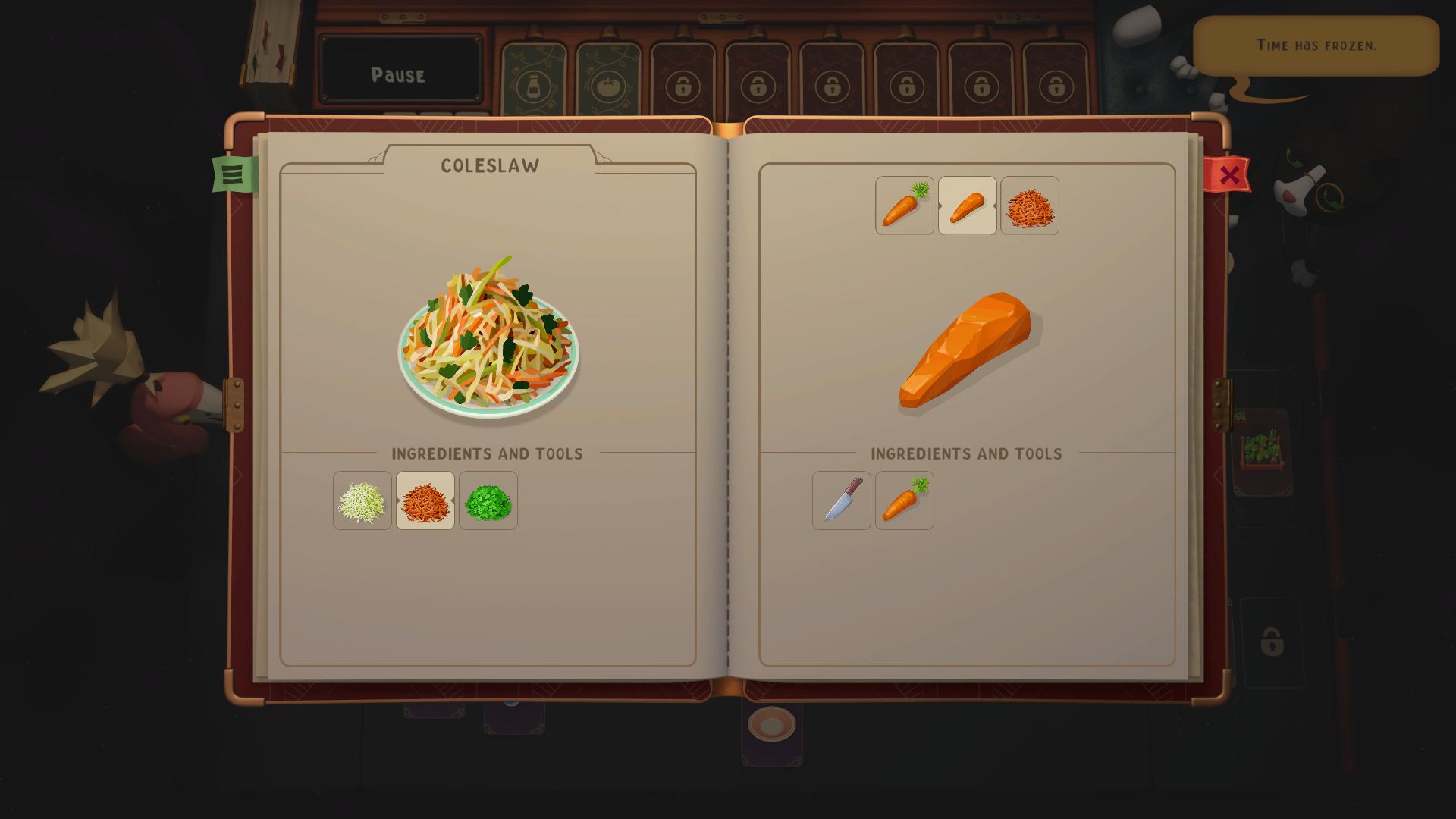
Final Verdict
Abra‑Cooking‑Dabra is an inventive, personality‑rich experiment that marries card management with culinary puzzles in a way that feels fresh and oddly addictive. The game’s art and music give Wonderland’s café a distinct, whimsical charm, and the core mechanics; deckbuilding, ingredient juggling, and recipe deduction; coalesce into a pleasing, almost OCD‑friendly loop of optimization and discovery. When the systems align, runs feel deeply satisfying: clever combos click, orders resolve elegantly, and the game rewards careful planning and creative improvisation. That said, the experience is held back by practical frictions; tight counter space and a sprawling recipe list that encourage repetitive pausing and reselling rather than emergent strategy, uneven level pacing that can turn long sessions into grindy marathons, and a handful of disruptive bugs that occasionally break runs. With targeted fixes; smarter workspace design, clearer onboarding and contextual tutorials, more reliable drop and purchase systems, and a round of technical polish; this could easily become a standout niche title. As it stands, it’s well worth a try for fans of card‑driven strategy and culinary puzzlers, especially on sale, but be prepared for a game that delights and frustrates in roughly equal measure.
Watch and Wishlist
Add Abra‑Cooking‑Dabra to your wishlist on your preferred storefront (Steam, App Store, Google Play, or console stores) so you’ll be notified about discounts, updates, and new content drops; follow Door 407 on social channels and the game’s community hub to catch patch notes, developer diaries, and sneak peeks that often signal fixes (autosave, bug patches) or meaningful additions (new recipes, cards, and UI improvements). Keep an eye on community galleries and streams for creative strategies and deck builds that reveal clever ways to work around limited counter space, and watch for demo windows or sale periods if you want to try before committing; early patch notes and player feedback threads are the best place to judge whether reported bugs have been addressed and whether the game’s pacing and quality‑of‑life changes have landed.
Key Takeaways
• Concept: A creative mashup of deckbuilding and kitchen puzzling set in a whimsical Wonderland café.
• Strengths: Charming presentation, satisfying recipe mechanics, and meaningful deck upgrades.
• Weaknesses: Limited workspace, repetitive reselling loops for rare ingredients, and some game‑breaking bugs reported.
• Pacing: Pauseable planning makes the game strategic but reduces live tension; long levels can feel grindy.
• Who should play: Fans of card‑based strategy and methodical puzzle play; not ideal for players seeking a purely cozy, low‑stress cooking sim.
• Verdict: A promising, quirky title that’s fun when it works; fixes and polish would elevate it from good to great.
Game Information:
Developer & Publisher: Door 407
Platforms: PC (reviewed)
Release Date: November 17, 2025
Score: 9.0 / 10
Abra‑Cooking‑Dabra earns a high score for its inventive fusion of deckbuilding and culinary puzzling, its distinctive Wonderland charm, and a deeply satisfying loop of recipe discovery and optimization. The art, animation, and sound design give the café a memorable personality, and the pauseable, card‑driven gameplay rewards planning, creative combos, and careful resource juggling in a way that feels both clever and compulsively replayable. Points are docked for practical frictions; tight counter space, repetitive reselling for rare ingredients, uneven level pacing, and a handful of disruptive bugs; that occasionally turn a great run into a frustrating reset. Those issues are largely fixable, however, and they don’t erase the core pleasure of assembling elegant solutions under pressure. For players who enjoy methodical, card‑based strategy with a whimsical coat of paint, this is a strongly recommended pick, especially at a discount.